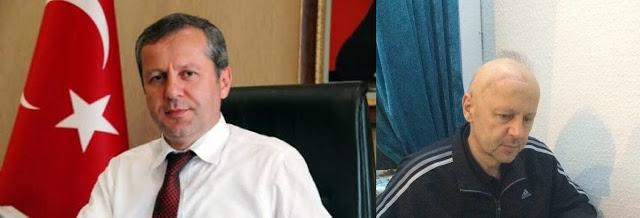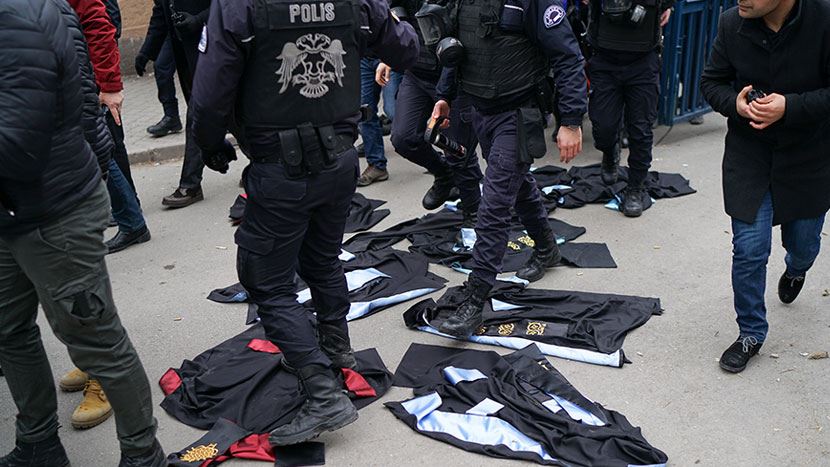A frail man in a black tracksuit with sparse hair next to a frighteningly big V-shape surgery scar on his head, looking down in evident exhaustion… That can hardly be how Ibrahim Ethem Kuris, former chief public prosecutor of Ankara, would like to be remembered but his picture taken last July as he waited his turn for questioning in an anti-terror investigation has become symbolic for the ordeal of more than 3,000 justices Turkey jailed in the largest crackdown the Republic has ever seen.
Diagnosed with a terminal lung cancer two years ago that has recently metastasized to his brain, Mr. Kuris is now in the 10th month of his pre-trial detention following nearly a quarter century tenure with the country’s judiciary. All efforts spent for his release have failed as the courts insisted on keeping him locked up. And as the government has furthered its control over the country’s media to a near-absolute level past year, friends had nowhere but online publications and social media to make their voices heard. A humble product of their efforts, the blog named Justice Held Hostage (JHH) has begun to share what those justices and the families they had to leave behind are going through.
“None of the authorities in Turkey can take free decisions. All bureaucrats have been heavily pressurised [sic]. Nobody knows what will happen to us in the future. We are in constant worry and fear,” writes the jailed former prosecutor’s wife in Apr. 24 post titled “#FreedomForKuris.”


In a violent coup attempt that left more than 200 people dead in the span of a few hours from the night of July 15 to the morning of next day, a group of rogue soldiers tried to end President Recep Tayyip Erdogan’s 14-year rule in Turkey. Defeating them with a large mobilization of masses against the putsch, Mr. Erdogan was quick to install an emergency rule to turn on all opponents of his reign.
Summary detention of civilians followed. Thousands of teachers, doctors, journalists, academics, businesspeople as well as justices were caught up in the process and jailed along with non-coup-participant members of the military and the police. The pretext was that they belonged to a controversial faith-based group, Gulen movement, that the government blamed for the violence and now brands a terrorist organization. The movement’s religious leader, Fethullah Gulen, a former imam who lives in self-imposed exile in the US, has repeatedly denied involvement in the bloody conspiracy and Turkey’s efforts to extradite him for the coup bid have so far not been successful.
The movement’s religious leader, Fethullah Gulen, a former imam who lives in self-imposed exile in the U.S., has denied involvement in the bloody conspiracy and Turkey’s efforts to extradite him for the coup bid have so far not been successful.
World’s worst jailer of journalists… and judges
With the post-July 15 clampdown on dissent, Turkey has assumed a notorious title from the most repressive regimes as “the world’s worst jailer of journalists” with more than 150 journalists now in prison across the country, more than in China, Egypt and Iran combined. The swift decline in media freedoms has drawn strong criticism from many European capitals and the Amnesty International has launched a #FreeTurkeyMedia campaign, like the one that helped secure the release of several Al Jazeera journalists in Egypt two years ago. The situation of the members of its judiciary, however, has received little attention although nowhere in the world are there as many judges and prosecutors in jail as in Turkey.
7 months in solitary confinement… and counting
During a televised program on April 2, Turkey’s Interior Minister Suleyman Soylu said anti-Gulen investigations led to “47,155 arrests” and that Turkey has shown “great meticulousness” in the process. Apparently, holding a cancer patient behind bars for months also qualifies as such!
So does forcing a senior judge, Neslihan Ekinci, to live by herself alone in a prison cell for 7 months. Her husband Dr. Huseyin Ekinci, also a former judge, was likewise first expelled and then jailed. Their single child, Rana Ekinci, a university student, now lives to be her parents’ voice outside. Yet, like Mrs. Kuris, she is devastated trying as too much time has passed without any progress on their loved ones’ situation.
In April 23 post titled “Scream of Helplessness,” she starts writing with the following opening line: “It would have been easy to say I feel invisible. Instead, I feel pathetically visible and completely ignored. I’m going to tell you my story but it frightens me not to know how it would end.”
As freshly-robed judges, the Ekinci couple were first posted to Diyarbakir’s Lice district in the early 90s where Rana lived until she turned 4. Then after a few more years in Yozgat and Gumushane, they served in Ankara and Istanbul. Particularly during their time in the Turkish capital, both assumed key roles within the Ministry of Justice and at one point Mrs. Ekinci became the first female deputy secretary general of the Supreme Board of Judges and Prosecutors (HSYK) and Mr. Ekinci worked as a rapporteur for the country’s Constitutional Court (AYM).
Until July 15 last year, they had no idea they could both be jailed and in their absence. Rana would have to move to her friends’ living room with all their assets were also frozen. As life had it, there was even worse to come for them. Separated from other inmates, Mrs. Ekinci was also put in solitary confinement in September last year.
Ever since, Rana writes, her mother is given one-hour yard time per day with “whole-life-sentence-serving convicts” and for the remaining 23 hours she is all by herself. And ask Rana, there is not much hope for her to be released back to the general population in prison: “The warden himself told my mother that they would always hold her there [in solitary confinement] upon a verbal suggestion by the justice ministry.”
Not a judge and not even an ordinary inmate anymore
The post-coup attempt investigations have imprisoned exactly 3,089 judges and prosecutors. Aside from Mrs. Ekinci, dozens of mostly high-profile former members of the judiciary are kept in solitary confinement. The rest share their cells with 20 to 30 former colleagues. They get to see and talk to their families behind a glass wall every week for half an hour while other inmates are entitled to an hour-long meeting. Their “open-visitations” during which they can sit around the same table with their visitors are in every other month unlike other inmates who can do that every month. Their right to a phone call is also restricted to a bi-weekly routine while other inmates, again, can enjoy that every week.
Jailer of judges jailed for corruption
On the night of April 18, detention of 3,090th justice was a breaking, yet usual, news for Turkish viewers. But this time a judge, identified as only H.A., was caught accepting $50,000 bribe from a defense lawyer. Four days later, both the judge and the lawyer were arrested and sent to prison.
That was the day before Rana’s emotional letter appeared on JHH website. The senior-year law student had a few words to say also about H.A. because he was the same judge who jailed both her parents along with 43 other former colleagues in the post-coup bid crackdown:
“That man to whom I am ashamed to call a judge had told my self-defending mother to shut up at court and said he would just wait for instructions on his mobile phone before arresting and sending them away to prison. Both in handcuffs, my father sobbing as my mother turned to me and said ‘Rana, you have to grow up now’. That man, now himself also in prison but for taking bribes, has stolen 10 months from our lives.”
No one knows how Rana’s story would end.
********
This article was possible thanks to your donations. Please keep supporting us here.

